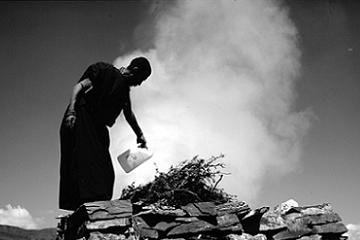NYIMA DOKDA POURS ME his butter tea. Too salty for me. But it has the taste of mystery. Until now, I’d only tasted butter tea in books about Tibet. Salt plus wind on the tongue.
On the walls hang thangkas, pictures of the Dalai Lama, the 17th Karmapa. I am in Bushwick, on Gates Avenue. In the street below this room, transplanted from Lhasa, are bodegas, stores that wire remittances to villages in Central America. I am in a part of my city where worlds collapse into one another without touching.
